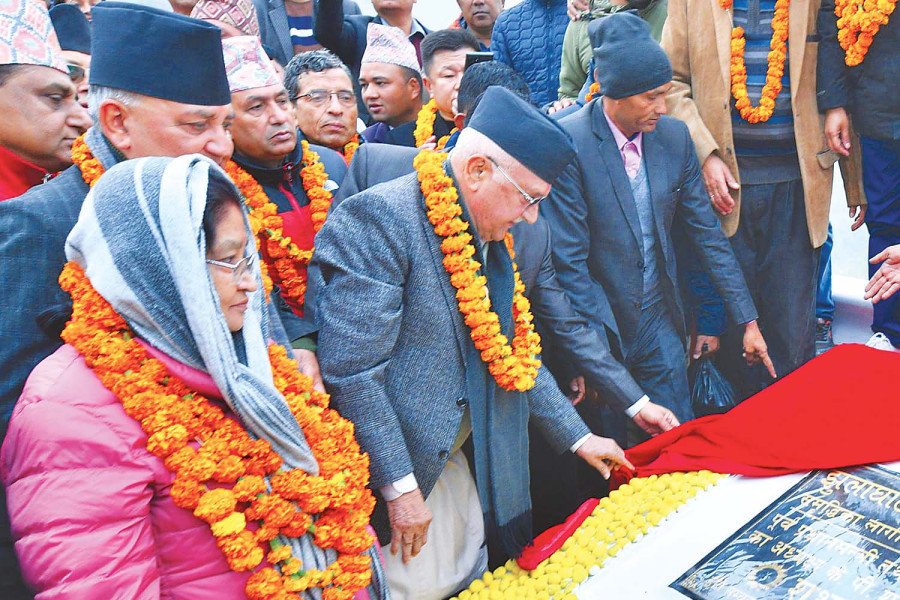Politics
Parties tour country to interact with people
Analysts say the political campaigns will not do much of public good besides engaging their cadres.
Post Report
Between November 30 and December 15, the main opposition, CPN-UML, conducted a march from Jhulaghat (Baitadi) in the far-west to Chiwa Bhanjyang (Panchthar) in the far-east under the banner of Sankalpa Yatra along the Mid Hill Highway.
Having interacted with millions of people living close to the Mid Hill Highway, also called Pushpalal Highway, the UML—its chairman KP Sharma Oli and other senior party leaders in particular—listed projects that people in the country‘s hills urgently need to meet their basic needs and aspirations.
Six weeks after wrapping the march spanning the country’s length, the UML submitted the list to the prime minister on Tuesday.
The party had collected 751 projects spanning 46 different sectors, said Pradeep Gyawali, a deputy general secretary of the party. Among them, 161 projects were collected from Gandaki Province, 170 from Koshi Province, 135 from Sudurpaschim, 113 from Bagmati, 89 from Karnali, 75 from Lumbini and eight from Madhesh Province.
Later in December, Rastriya Swatantra Party President Rabi Lamichhane conducted a march on the Narayanghat-Butwal section of the East-West Highway in order to pressure the government to complete the project whose deadline was extended twice. Now the party has decided to conduct more such marches across various 27 project sites that have seen unnecessary delays.
The ruling CPN (Maoist Centre) concluded a four-month long special campaign of party transformation. Upon completion of the drive, Maoist Centre vice-chairman Agni Prasad Sapkota concluded that the campaign had been largely successful and instilled excitement and hope in the public.
Political parties conduct several organisational activities to stay relevant, to connect with the people and to interact with them. But the recent trend has been of going for long marches and engaging with the people. Experts view these tactics as the parties’ early campaigns for the 2027 general elections.
The largest party, Nepali Congress, is no exception either. The ruling party has announced a march across the East-West Highway from January 27 to February 9. According to Congress General Secretary Gagan Thapa, he will be on the Mechi bridge in Bhadrapur-5 of Jhapa on January 27 for what he calls Sambad Yatra. Thapa writes on X (formerly Twitter): “Now I will come to your own village and your own place to meet you.”
The party said it will listen to people’s expectations, suggestions and grievances against the three tiers of government under the banner of Samudaya ma Congress (Congress in the community).
According to the Nepali Congress, it has dispatched representatives to all 77 districts and senior leaders like office bearers, former office bearers and party leaders will coordinate and monitor the activities.
Besides listening to the public's grievances, the party plans to hold events in 6,742 wards of the country on Martyr’s Day, on January 30. According to the party circular, central delegations will listen to public grievances and take suggestions from the people on the performance of government agencies. They will later convey the grassroots concerns to the relevant governments—central, provincial and local. The party will take the initiative to address the problems, said leaders.
“The party will take stock of the service delivery, development activities, good practices at the community level and take the initiative at reforms in policy-making. Besides listening to the grievances, during the campaign, the party representatives will also inform the people about efforts made by the party and will dispel wrong notions about the party,” said the circular.
Hari Roka, a political analyst, said such campaigns make no fundamental difference. Such activities renew the contacts between the leaders and cadres of a party but do not bring any changes in the lives of the people, he said.
“These parties have the money, so they are going to spend it,” Roka said. “But these activities and programmes are not of people’s concern. These parties should speak up on the state of the country’s economy, rampant corruption, and issues of health, education and infrastructures, among others.”
Roka added, “These programmes are not aimed for the people. The parties are just engaging their cadres.”




 18.12°C Kathmandu
18.12°C Kathmandu














